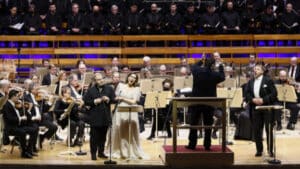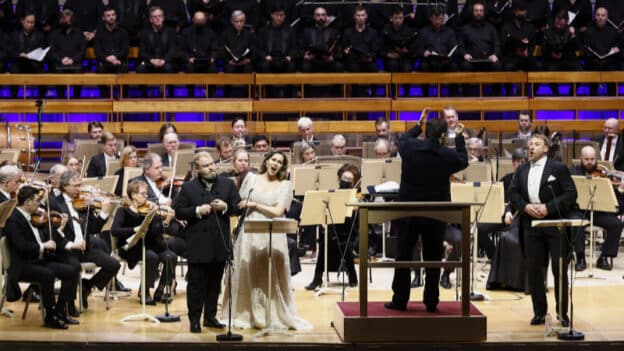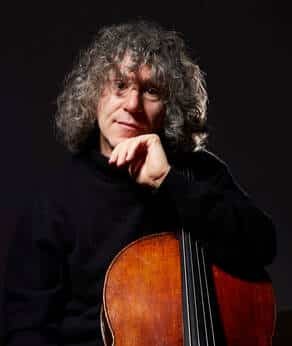Uneasy nights at the Boston Symphony
OrchestrasFollowing a NY Times review that undermined the music director, Slippedisc’s Susan Hall went to see how the orchestra fared at Carnegie Hall in Shostakovich’s Lady Macbeth of Mtsensk.
by Susan Hall
The Boston Symphony led by its music director perhaps-in-perpetuity, Andris Nelsons, performed Dmitri Shostakovich’s Lady Macbeth of Mtsensk at Carnegie Hall. While family members of the BSO musicians speak about instrumentalists’ problems with the conductor, these were not evident in Lady Macbeth.
The orchestra was spot on. Entrances were brisk and crisp. Exits abrupt when they should be. We heard a clear, exciting rendition of a complex and difficult score with all its sex and humor in position. The erotic yearnings of the heroine, sung by Kristine Opolais, were lyrical, and included the seductive removal of knee-high stockings. The satiric clowning of Alexander Kravets as the Shabby Peasant amused. The intensity of the opera was sustained for three hours and captured in spades under Nelsons. The ironic additions of the cancan, gallop, foxtrot, and an imbalanced waltz disarm the listener and intrigue.
What turns Andris Nelsons on? Without a doubt, Dmitri Shostakovich. He has won Grammys for his recordings with the BSO of the Shostakovich Symphonies no. 4, 5, 8., 9 , 11 and the Passaglia from Lady Macbeth of Mtsensk, performed at Carnegie in its original form. Shostakovich is ear-catching. Since Leonard Bernstein first won a Grammy performing the composer, Shostakovich appears regularly on the list of nominees and winners of the Grammys. Nelson’s mentor, Mariss Jansons, with whom Nelsons had a relationship clouded in mystery, won a Grammy for Shostakovch in 2006. Nelsons may have learned to express the dynamic extremes of Russian musical fare from Jansons.
Shostakovich dedicated Lady Macbeth to his first wife. The performance at Carnegie felt like a dedication to Nelson’s first wife, Kristine Opolais. She gave a perfect performance, ranging from unfulfilled desire to a shriek of horror and pain. This evening erased memories of the pairs’ last scheduled performance at the Metropolitan Opera when Opolais left Tosca and Nelsons followed her.
Now at the welcoming Carnegie Hall they triumph in a blazing performance of music by a composer, who like these two Latvian artists, suffered under tyrannical Soviet regimes.
Shostakovich is heralded as the symphonist of the second half of the twentieth century. At Carnegie, the stage is packed full of musicians, the orchestra and the Tanglewood Chorus filling every inch. The Orchestra is shaped like a softly arcing new moon, sending the sound out through the Hall, as acoustically resonant as the BSO’s home.
Shostakovich was literary. He called this work a tragic satire. Laugh-out-loud funny at times, one senses how important humor is for the success of a work,whether it’s bleak or richly conic.
The orchestra speaks. Sometimes you look up to try to see what instrument is speaking–brass, string or human. Words sung are never in conflict, because the orchestra too has a voice. Its voice is not a caption, but rather composed to undermine the tyranny of words and offer a “continuous symphonic current.” (The composer’s words). Peculiar brass sounds arrest us. For instance, two brassy barks warn about the bullying father-in-law, sung by Günther Groissböck.
Striking contrasts are developed between the lyricism of Katerina, a murderess who Shostakovich makes sympathetic by portraying the men in her life as barbarians. They in turn are characterized by decadent, western-oriented music and starkly set off the very human Katerina. Only the prisoners in the final Act are as lyrical, for they are symbols of oppressed people.
The novel on which the opera is based was a “tight-lipped shocker.” Lips here are as loose as can be imagined. Shostakovich dares to be irreverent, politically incorrect and dissonant. He is also scatalogical. The BSO brass section played his farts and pelvic thrusts with verve and humor. High, middle and low brow singing encompasses all the emotional registers. The thick musical world evokes both our awe and sadness.
As Nelsons and the BSO perform, we sense the urgent need to look at what’s going on around us. You cannot avert your gaze from the ugly. Shostakovich and his interpreters don’t. This message is also sent by Carnegie Hall as programming examines the music of the Weimar Republic. The Nazis banned Lady Macbeth of Mtsensk before Stalin did. This performance illustrates life lived under tyrannous regimes and suggests why we should continue to listen to them and glare.
Photo: Winslow Townson/BSO

Boston Symphony Orchestra at Symphony Hall, Thursday, Jan. 25, 2024, in Boston. (Photo by Winslow Townson)
Lady Macbeth of Mtsensk
Andris Nelsons, conductor
Kristine Opolais, soprano (Katerina Izmailova)
Brenden Gunnell, tenor (Sergei)
Peter Hoare, tenor (Zinovy Izmailov)
Günther Groissböck, bass (Boris Izmailov and Ghost of Boris)
Michelle Trainor, soprano (Aksinya)
Alexandra LoBianco, soprano (Female Convict)
Maria Barakova, mezzo-soprano (Sonyetka)^
Matthew DiBattista, tenor (Teacher)
Neal Ferreira, tenor (Foreman)
Charles Blandy, tenor (Foreman & Drunken Guest)
Yeghishe Manucharyan, tenor (Foreman & Coachman)
Alexander Kravets, tenor (Shabby Peasant)
David Kravitz, baritone (Millhand)
Brandon Cedel, bass-baritone (Porter & Policeman)
Joo Won Kang, baritone (Steward)
Patrick Guetti, bass (Officer and Sentry)
Goran Juric, bass (Priest)
Anatoli Sivko, bass (Chief of Police)
Dmitri Belosselskiy, bass (Old Convict)^
Tanglewood Festival Chorus
James Burton, conductor
Benjamin Richter, staging coordinator






Was this review written with A.I.? How could this person have seen the same performance AFTER the NYTimes already reviewed it? They performed it twice? Nelson’s Shostakovich has been really boring and uneven, no matter WHAT Gramophone says.
The entire cycle doesn’t always work, partially because Shostakovich calls for really brazen playing that veers into the truly ugly at times, but much of it does work, and displays the broad array of colors, and attention to phrasing, that the BSO does so well. I had a chance to hear several of the live performances (including this one at Carnegie Hall), and they all came off quite well. I do agree, the tone of this review is strange, but are they perhaps referring to a review in the Boston papers of the concerts there before the tour?
I went back and looked at the beginning of this post, and the author is referring to the NYT review, which was mixed (and not particularly insightful), but it hardly “undermined” the conductor. More sensationalism.
Yes, they performed it twice, first in Boston and then in New York. I was at the NY performance, it was electrifying.
There were several performances
One of them is available to listen to on the BSO website if you go to the listen to concerts section
The BSO’s Saturday night performance of ‘Lady Macbeth’ in Symphony Hall January 27th was superb. Likewise, two weeks earlier, the orchestra and Seong-Jin Cho gave a brilliant account of Ravel’s Concerto for Left Hand, followed by a stunning Sacre.
Andris Nelsons is highly regarded by the players I know, and during his tenure the orchestra has excelled in repertoire for which it was not previously quite so admired: Shostakovich, Strauss, Mahler, Bruckner, Wagner. An accomplished trumpeter himself, Nelsons is a particularly flexible, sensitive accompanist, and has elicited some of the best singing we’ve heard – not only from Opolais but also Fleming, Goerke, Graham, Hawlata, and Kaufmann.
No MD can please or inspire all the people all the time, nor excel in every corner of the repertoire, but Nelsons and the BSO are generally sounding as good or better than this longtime subscriber’s heard them.
Bravo Nimitta – I concur. We saw Lady MacBeth on the Thursday night performance in Boston, and it was riveting. It was one of the best things Nelsons has done with the BSO in my opinion.
Notwithstanding the professional naysayers (and yes, I’m talking about you ZW), Nelsons is doing a very good job in Boston, and the BSO is consistently playing at a level that would be the envy of any orchestra anywhere. In my book, this is a great time to be a regular BSO listener. We are very lucky.
The BSO is one of the US Big Four and it’s healthy to have a debate about their artistic results on major press outlets.
Other orchestras have fallen out of the Big Five right into obscurity. The CSO, for example, just barreled through an anonymous European tour; its concerts, the first in Europe since 2020, have been ignored by many; for example, the Paris and Milan concerts have not been reviewed – as far as we can see – by Le Figaro or Il Corriere della Sera (France’s and Italy’s most important newspapers). This is hard evidence of how irrelevant the CSO has become – which translates directly into poor ticket sales and subpar labor contracts.
The most excellent former critic of Il Corriere della Sera, Francesco Maria Colombo, attended the CSO concert in Milan and wrote:
‘[…] the Chicago Symphony Orchestra is no longer the dazzling armored I remember since the years of Solti […] As for Muti himself […] Even those who don’t love his style of interpreter must recognize the technical mastery of a connoisseur, a preparatory and, let’s say, “mechanic” of the orchestra.
Unfortunately the program was combined very badly: two boulders that have motives of interest, but put one after the other not only fit like cabbage for a snack, but form a deadly weight on the stomach. “From Italy”, as I said, opened the concert: it’s an incredibly bad piece to be by the divine Richard Strauss, a folklore pastiche who probably wrote for snobbism and to sneakily make fun of everyone, starting from Bülow to whom he’s dedicated. […] Paradoxically, listening to the singable themes of this score (especially the embarrassing theme in E major proposed by first violins and cellos in the first half) performed […] by the Chicago arches, creates a problem instead of solving it: a dimension comes out, let’s say, from “Rustic Cavalleria”, accompanied melody, ignorant of decency. […]
In general, it seems to me that the characteristics of [Muti] the interpreter are those I already knew: […] the control of sound, rhythm, phrasing, dynamic relations is exceptional. But let’s talk, precisely, about dominance and control: not about the emotional dimension, which seems frankly inert to me. There are visionary directors capable of transforming in one evening (or in a few jokes: Temirkanov and the attack of the third movement in the Tchaikovsky Fifth, probably the most shocking 5 seconds of music I have ever heard) our perception of sound, music, art, identity, life: among those I would say Temirkanov, Prêtre, Melles, Karajan, Haitink, Maag, Végh, Kleiber. Some of them were much less technically capable than Muti, but they knew how to evoke infinite emotion. This evening I had the experience of a strictly oiled car […] from which there is not a drop of emotion: this, to be clear, is my personal impression, of a spectator among thousands of others trying to listen without arrière-pensées. Everything is perfectly executed, but I see a dead letter. Everything is carefully enameled on the surface, but you never have the impression that under the surface there are the dream, the night, the mystery, the fairy tale, the heart, the unknown, the abyss: everything is in its place, as if music was something to master thoroughly and with the highest professionalism, but not something to let go of without fear, until we put our certainties in check. But here come into play categories that would be complex and perhaps unnecessary to try to decipher: the relationship of the ego with oneself, security and insecurity, the depth or not of the cultural vision and especially the awareness or lack of style. It would take us too far to talk about it.
For now I can record the result of this concert, greeted by […] two encores, the Intermezzo of the “Manon Lescaut”, which I didn’t like because I found it loaded with a bit of plateal effects; and the Symphony of the “Jiovanna d’Arco” […]. When I go out I find myself lost and ask myself the same question I asked myself 24 years ago: why is it that this musician who is so talented, so competent, so strong in preparation created by excellent studios, so expert, after all so good, provokes me so much confusion? Why do I leave his concerts not with the experience of joy that explodes from music, but with a shadow of sadness?’
Well, Signor Colombo, certain questions in life are better answered in the manner of former Chicago audiences and subscribers: if you want to listen to good live classical music, drive to Cleveland for the week-end.
Chicagorat, you’re less a detractor than a stalker.
Anyone who would follow someone they ‘hate” so much all through Europe and search high and low for reviews in 3 foreign languages is more than merely obsessive: there is a fine line between hate and love, and I’m afraid, Chicagorat, that you are deeply, madly, in love with Ricky.
As for the Milan review, I’d bet the other Ricky at La Scala paid handsomely for that review of his nemesis, lol.
You’ve got to be pretty bourgeois to consider ‘glaring’ an effective strategy against tyrannous regimes.
This is one of the strangest symphonic concert reviews I’ve ever read
“Mariss Jansons, with whom Nelsons had a relationship clouded in mystery”
???
Not exactly related, but… I saw the BSO at Symphony Hall tonight, and there was a new person in the concertmaster’s chair. She’s not one of the associate concertmasters, and I didn’t see her picture among any BSO violins. I don’t think she’s from Gewandhaus either. Anyone know who she is? Are they trying someone out?
FWIW, the violins sounded more together and clearer than I remember in a long time.
https://i.postimg.cc/1trbnrk4/IMG-2660.jpg
Bracha Malkin was listed in the program as concertmaster for these performances.
Nathan Cole played in Boston the week before.
I believe the Concertmeister position is open, and the orchestra has different players for various projects, until the position is filled. The concertmeister at Carnegie Hall played beautifully.
“like these two Latvian artists, suffered under tyrannical Soviet regimes”. Nelson was 13 and Opolais was 12 when the USSR collapsed and disappeared from the map. How exactly did they suffer as artists at ages 12 and 13? Is the rest of the article similarly credible?
It is fair to allow a little licence as it would not have been easy to set out on a career in those times.
Even as children they would be aware of the restrictions in society. Further, after the USSR collapse, it wasn’t as if a switch was flicked and everything changed overnight.
I recall Andris Nelsons has spoken of long, regular overnight or early morning train journeys back and forth from his work in Riga to St Petersburg for his lessons.
It is not easy to put ourselves in the shoes of people making their way through life in what had been a totalitarian regime. We don’t know what options or choices were available.
Those who grew up there know very well what options were available, there were many excellent ones for music education. There was no artistic suffering of teenagers there, the article is simply wrong. His train rides were his choice and also a great opportunity to access the best teacher(s) apparently not available in Riga. He was likely not 13 at that time. Someone from the middle of Pennsylvania (forget about Kansas, Toto), would simply not have the opportunities to take regular train rides to the best teachers in New York as there is no option of convenient train travel for most of the US.
Doesn’t the Keystone train run through the middle of Pennsylvania, providing 13 trains a day to Philadelphia and New York City?
There is a heck of a lot of Pennsylvania beyond that corridor!
Sorry, but how “regular overnight or early morning train journeys back and forth from his work in Riga to St Petersburg for his lessons.” is related to totalitarian regime?
People, who want to achieve smth in their life, constantly overcome struggles – especially in case if they want to learn from a top-tier teacher, it is always their choice.
I believe lots of talented youngsters do this even nowadays, in not-so-totalitarian regimes.
Of course, I accept Claudio’s and Guest’s comments. Yes, people everywhere make sacrifices to pursue good opportunities.
What I am pointing out is that many people from satellite states around the USSR were very much involved in Russia. aware of the history and political conditions and limitations placed on their families previously, even though they were on the cusp of a new order.
They were not “suffering” but were to a degree constrained and fully aware of how they could behave. Even today, Latvia has a significant Russian population (many of them would be in favour of a return of the Soviet Union). The people of Latvia, Lithuania and Estonia are fiercely independent but are bound to be nervous on the border of Russia, and seeing what is happening in Ukraine.
You wrote: “I recall Andris Nelsons has spoken of long, regular overnight or early morning train journeys back and forth from his work in Riga to St Petersburg for his lessons.”
This is hardly a “suffering” unique to the Soviet time. Many people/children around the world take long trips to get form home to their lessons.
The possessive of Nelsons is not Nelson’s, but that is used more than once in this review.
Not sure where the author come off talking about the musicians having issues with Nelsons. Perhaps she went to see Chad who is the new Iago of the BSO. I know for a fact from the inside that Nelsons is beloved by the orchestra and the administration save Chad and his male secretary. I suspect Chad and his goon will not be there long.
Seems like Nelsons sure likes to perform Shostakovich. Too bad it’s so mediocre.
I attended the splendid staging in Symphony Hall in Boston a week ago. I sat close to the stage (the tubas spilled down from the stage onto the orchestra floor within blasting distance of my left ear). I was well-positioned to observe one piquant moment: Nelsons raised his baton at the start and glanced at Opolais with a raised eyebrow, which Opolais answered with a raised eyebrow. And then they were off!
I wish I had been there. I have heard Nelsons conduct Shostakovich – it was brilliant. There are people who say we should stop listening to Russian music. They are wrong. My attitude is that people should continue to listen to Russian music but donate to charities supporting Ukraine. There could be a Tchaikovsky fund to help Ukraine. Putin would hate it.
What a terrific review of what sounds like an amazing concert performance
The Saturday broadcast of Lady Macbeth of Mzensk was superb, and easily the best played i have ever heard.